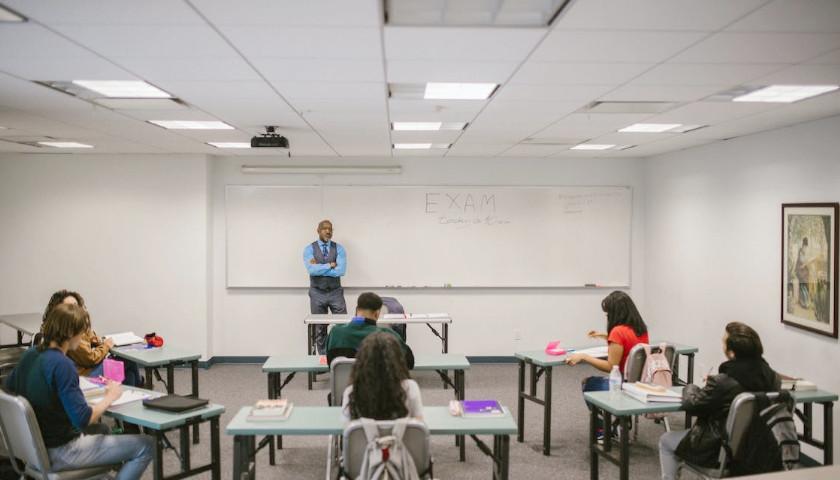The Tennessee State House K-12 Education Subcommittee considered several proposals before agreeing to accept House Education Chairman Mark White’s (R-Memphis) proposed legislation that would expand opportunities for students to avoid retention while offering K-2 students more resources to stay on track.
State law, as it currently exists, requires that any third-grade student who does not score as “proficient” on the English Language Arts (ELA) portion of the Tennessee Comprehensive Assessment Program (TCAP) test must be retained unless they meet specific obligations. The law, slated to go into effect this spring, has faced considerable opposition from parents and community members. White’s amendment, presented by State Representative Scott Cepicky (R-Culleoka), consists of three components intended to improve third-grade retention policies while helping students who might not need it avoid retention.
The first would allow third-graders who score as “approaching proficiency” on the annual TCAP but have scored above 50 percent on the last state-approved benchmark test administered by local districts to advance to fourth-grade. A proposition that appears to run counter to recent testimony provided to lawmakers by Tennessee’s testing vendor, Pearson.
During that testimony, White questioned Pearson representative Amanda Deaner on whether a student who does well on benchmark tests will do well on TCAP testing. She responded, “I don’t have data that says exactly how those two things would compare, but I think you can say it would inform their success on TCAP.”
During the same hearing, Cepicky asked Deaner, “Can the universal screeners supplant TNReady?”
She answered, “No, because you are measuring different information.” She explained that the two are different assessments.
Tennessee’s local superintendents told The Tennessee Star that “the line between benchmark assessments and universal screeners is blurred, to say the least.” State Board rule 0520-01-03-.15 on Universal Screeners states the following:
“11 (a) The Tennessee Universal Reading Screener and Tennessee universal math screener provided by the Department shall serve as the state-adopted benchmark assessments under the Innovative Benchmark Assessment Pilot Program for kindergarten through grade three (K-3).”
The TDOE pays for, and makes available at no cost to districts, AimsWeb provided by Pearson. AimsWeb serves as the Tennessee Universal Reading Screening and the state-adopted benchmark assessment.
Tennessee’s teacher union, Tennessee Education Association (TEA), supports using additional measurements.
“Multiple measures are important when understanding student achievement for young children,” Tanya Coats, president of TEA, told ChalkbeatTN. “A year-end test that runs for 180 minutes for 8- and 9-year-olds should not be the only way we understand where students are in English language arts.”
Additional provisions expand who may assist a student’s parent or guardian in filling an appeal and expand tutoring opportunities for those identified as at risk in grades K-2. Further, the amendment removes the stipulation that local districts must utilize a tutor provided by TN All Corp, a program recently created by the Tennessee Department of Education (TEA) of which only 87 of Tennessee’s 147 districts are participants. The new language expands the list of providers available to districts.
During the discussion, few objections were voiced by committee members. Only State Representatives Sam McKenzie (D-Knoxville) and Bryan Ritchey (R-Maryville) offered substantive questioning.
Ritchey pointed out to lawmakers that when it comes to reading scores, “over the last 10, 20, 30 years we have not done anything that has significantly increased literacy rates in Tennessee.” Richey further expressed frustration that nobody came down to his office and explained the bill to him” before introduction. He added that he is “not in favor of moving the goalposts further down the road, lowering things down, or pushing somebody through and awarding participation trophies.”
The amendment gives him concern that those will be the unintended results.
McKenzie is concerned that too many kids will be retained. He asked sponsors what percentage of third-graders would be at risk of retention under the proposed changes. The bill’s sponsors could not provide an estimate. Cepicky responded, “There would be more retained if we didn’t pass this bill.”
Governor Bill Lee has not officially weighed in on the proposed revisions, but in a recent editorial for The Tennessean, he writes:
“Under our law, a third grader struggling with reading will not simply be passed on or “socially promoted.” Instead, that child will receive additional strong support, such as free tutoring, summer camps, or options for re-testing. Students who are still learning English or living with a disability will receive an alternative suite of interventions. Contrary to what critics will say, Tennessee’s reading success plan is about moving kids forward, not holding them back.”
The proposed changes passed out of committee on a voice vote and now move to the House Education Administration Committee for scheduling.
– – –
TC Weber is a reporter at The Tennessee Star and The Star News Network. He also writes the blog Dad Gone Wild. Follow TC on Twitter. Email tips to [email protected]. He’s the proud parent of two public school children and the spouse of a public school teacher.






Same old garbage. Find some way to socially promote kids who will be doomed to failure in later school years. Face it folks, the Tennessee legislature is nothing but a bunch of good ole boys who do not have the backbone to deal with any serious issues. Disgusting.